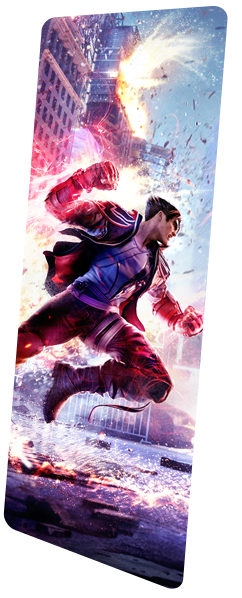
Game Design Article – Designing UVS: Complexity, Mental Load, and UniVersus
Designing UVS: Complexity, Mental Load, and UniVersus
Our focus at UVS Games over the past two years has been growing UniVersus. We’ve brought new products to market, awesome new worlds to visit, and re-examined how we can make UniVersus be the best it can be. Today I’m starting a new article series that focuses on how Game Design tackles the challenge of helping to grow UniVersus. Today we’re going to start with the concept of “mental load” and how that impacts players playing games.
Memory and Game Design
Human beings have two types of memory:
-
Short-term memory, used for processing information in the present quickly
-
Long-term memory, used to call up important information previously retained from short-term memory
The average human can hold 5-7 things in their short-term memory at which point they either commit an item to long-term memory storage for quick recall in the future, or forget an item to make room for the next thing needed in short-term memory. What this means for games is that the average player can handle 5-7 new pieces of information and then they either need to permanently commit something to their long-term memory or they need to be able to disregard it to focus on memorizing something else.
Let’s look at two real world examples: checkers and chess. Checkers is a great game to teach quickly because there isn’t much you need to know:
-
There are two colors of pieces
-
There is one type of game piece in each color
-
Game pieces can move forward one space
-
Game pieces can hop over opposing pieces to “take” them
-
The player who captures all the other player’s game pieces wins
That’s five pieces of “data” a player can handily store in their short-term memory to start playing, then commit the items to long-term memory as they’re playing. “There are two colors” commits to long-term memory pretty quickly, leaving open room for a new piece of data to be tracked, like the concept of “Kinging” a piece when it reaches the end of the board.
Chess, on the other hand, is a bit more complex. It has more pieces: 16 pieces on either side of the board for 32 pieces in total compared to Checkers’ 24. Chess does something clever and helpful with its pieces: instead of 32 unique pieces for which you need to memorize a specific movement per piece, they duplicate the pieces on either side of the board, cutting down what you need to remember to just 16. Sixteen is still a lot, so to make it easier the front 8 pieces are all identical Pawns that move in the exact same way. That cuts your 16 pieces of data to just 9. But wait, there’s more! Within the 9 pieces on the board, three are duplicate Rooks, Knights, or Bishops. Instead of 9 pieces of data, you actually only have to memorize the specific moves for 6:
-
Pawns
-
The King
-
The Queen
-
Rooks
-
Knights
-
Bishops
While the 6 unique pieces of Chess are more complex than the 1 piece from Checkers, the design allows the game to fit the 32 total pieces on the board into a human’s capacity for short-term memory by asking us to learn only 6 new things. Furthermore the design of the game ensures your early turns are often focused on pawn movement, allowing you to commit the pawn’s moves to your long-term memory quickly freeing that space up to use on new data for short-term storage. (Yes Chess is far more complex as you play more, but if a player can’t get over the initial hurdles of learning the core gameplay loop they’ll never get deep enough to trouble with castle’ing or en passant!)
The need to learn new data and calculate how to use it in a game is called “mental load,” or the load put on your brain in order to play the game. Both chess and checkers are great examples of games that work well within a human’s short-term memory to provide a reasonable learning curve by keeping mental load within the confines of short-term memory storage. Their track record over the course of years speaks to the cleverness of their design and teaches a valuable lesson: too much mental load in a game turns players away from it, but the right amount presents a puzzle human beings are delighted to keep working at solving for literal centuries.
Measuring Mental Load in UVS
As game designers we manage the question of balancing mental load in games every day. Before we can consider the question of whether the mental load in UniVersus is in a healthy spot we first need to provide a framework for analyzing how to measure it in the first place. Let’s consider a typical game of UniVersus, and look at how mental load grows over the course of a few turns. Let’s start with some assumptions to make the exercise functional:
-
Each player starts with a 7-handed character
-
A “card” counts as 1 piece of data for a player to track
-
Each player plays 3 Foundations per turn, no more and no less
-
Each player attacks once per turn; no more and no less
Given that assumption, here is the mental load over the first few turns between two opponents we’ll call Bill and Tammy:
-
Bill draws his opening of 7 cards; he has 7 bits of data to consider, a mental load of 7
-
Bill plays his first turn, leading on 3 foundations, still with a mental load of 7 to worry about
-
Tammy started with her opening hand of 7 cards, but draws for her turn and has Bill’s 3 Foundations to consider; her mental load for the first turn is 11
-
Tammy plays 3 Foundations and passes the turn
-
Bill starts his second turn; after drawing, he now has 7 bits of data in his hand, 3 in his cardpool, and 3 in Tammy’s stage making his mental load a total of 13
-
Bill plays three Foundations and one Attack; Tammy plays one block, meaning Bill ends the turn with a max mental load of 14 bits of data, and 12 permanent bits he has to track: 6 Foundations on his board, 3 Foundations on Tammy’s, and the 3 cards in his hand
-
Tammy starts her turn, fills her hand, and has 7 cards in hand, 9 on the battlefield between her and Bill’s Foundations, for a total mental load of 16 bits of data to track, more than doubling her initial mental load by the second turn!
The game gets more complex from there, with each player expanding the number of attacks and foundations they play each turn from that point forward. The interplay between each of these card types is what makes UniVersus a fun game to play, but the mental load for an inexperienced player grows exponentially very quickly. A high starting mental load, outside the bounds of a human’s short-term memory, that doubles by the second turn for players is very high as a mental load threshold in the TCG space.
A high mental load is a risk for any game as it represents an “offboarding” point for players who hit a wall, feel bad about not knowing how to manage all the information coming at them, and choose to pursue other ways to spend their time instead of UniVersus. We saw this over the past two years as we attempted to build out new demo experiences for the game: new player feedback consistently indicated UniVersus was very hard to learn. The numbers also showed us the dark impact of that truth: our growth rate amongst new players needed a lot of work. New players washed out very quickly because our mental load was very high, and being unable to bring on new players is a Very Bad Thing.
Fixing the Very Bad Thing
Our conclusion from our examination of the UniVersus game engine was clear: we weren’t succeeding at onboarding new players, and a big part of that was the complexity from mental load. Solving that for our new players, however, poses a secondary risk: if we streamline our game to appeal to these new players and go too far, we may over-simplify the game in a way that feels unfun to the UniVersus fans that have been with the game for years. That’s a very tricky balance to strike for game designers.
Next week in my second article I’m going to dive into some of the tactics we’ve been using to help bridge this gap, working towards the goal of making UniVersus more accessible to newer players while still being the challenging game experience our veterans have come to love.
See you in a week!





